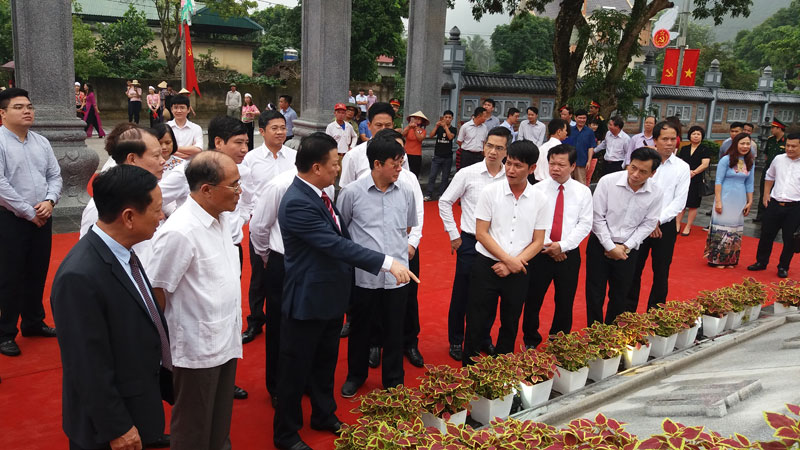
(HBO) - A commemorative house dedicated to contributors to and workers of the first money printing factory of Vietnam was inaugurated on May 5 in Co Nghia commune of Lac Thuy district, Hoa Binh province.
The
inauguration ceremony was attended by former Politburo member, former National
Assembly Chairman and former Minister of Finance Nguyen Sinh Hung; member of
the Party Central Committee and Minister of Finance Dinh Tien Dung; and member
of the Party Central Committee and Secretary of the provincial Hoa Binh Party
Committee Bui Van Tinh.
 Former
Party and State leaders and officials of the Finance Ministry and Hoa Binh
province visit the commemorative house.
Former
Party and State leaders and officials of the Finance Ministry and Hoa Binh
province visit the commemorative house.
The relic site in Chi Ne Farm in Co Nghia
commune was the first money printing factory of the Democratic Republic of
Vietnam, now the Socialist Republic of Vietnam. There, the 100 VND or "green
buffalo” notes – the banknote with the highest face value at that time – along
with the notes valued at 50 VND, 20 VND, 5 VND and 1 VND of Vietnam’s
revolutionary government were issued, holding a significant role in the first
years of the country’s independence.
In 1947, President Ho Chi Minh visited the
factory, which has become an important revolutionary relic site of Hoa Binh
province as well as Vietnam.
To honour contributors to the factory, the Lac
Thuy District People’s Committee built the commemorative house. The
construction cost some 50 billion VND (2.1 million USD), 80 percent of which
was supported by the Finance Ministry and the State Treasury and the remaining
was funded by the local budget.
Addressing the inauguration ceremony, Minister
of Finance Dinh Tien Dung highlighted the significance of the "green buffalo”
note, which was a weapon in the economic-financial-monetary battlefield to
eliminate the Indochinese banknotes of the French colonialists in Vietnam.
He asked party committees, authorities and
people of Hoa Binh province and Lac Thuy district to create more favourable conditions
for promoting historical values of this relic site so that it can become a
pride of the revolutionary tradition.
Meanwhile, Secretary of the provincial Party
Committee Bui Van Tinh thanked ministries, central agencies, businesses, donors,
and local people for supporting the construction of the commemorative house.
He also told local authorities and people to
bring into play the relic’s values, popularise its historical values, and
connect this relic with others in neighbouring localities to form cultural and
historical tours, thereby helping to enhance local development./.
Mai Chau district has firmly established itself as a standout destination on Vietnam’s tourism map, attracting both domestic and international visitors with its breathtaking landscapes, rich ethnic culture, and warm hospitality. However, beyond its natural and cultural charm, a secure and well-managed tourism environment has added to Mai Chau’s appeal.
As Vietnam enters a new phase of economic and administrative reform in 2025, Hoa Binh province is stepping up its efforts to streamline governance, boost economic growth, and attract investment.
The Hoa Binh provincial People's Committee held its monthly meeting on March 26 to review the progress of key projects, assess budget revenue and public investment disbursement, provide feedback on draft documents for submission to the provincial Party Committee's Standing Board, and discuss other important matters related to the committee's governance activities.
Playing a key role in Hoa Binh province’s economic development, Luong Son district has been focusing on science and technology development, innovation, and digital transformation.
Identifying the application of online public services as a key step in administrative procedure reform and e-government building, Kim Boi district has proactively provided services and supported residents and businesses in accessing and utilising full-process online public services promptly and efficiently. The locality aims to lift the rate of end-to-end online public services to over 90%, with all officials and civil servants handling tasks in the digital environment.
Nguyen Anh Tuyet, hailing from a family steeped in the ancient art of herbal medicine, is transforming local medicinal herbs into high-value concentrated extracts, elevating their worth and healing potential.



 Former
Party and State leaders and officials of the Finance Ministry and Hoa Binh
province visit the commemorative house.
Former
Party and State leaders and officials of the Finance Ministry and Hoa Binh
province visit the commemorative house.